
Journal of Moral Philosophy
Scope & Guideline
Fostering Dialogue in Ethical Philosophy
Introduction
Aims and Scopes
- Exploration of Ethical Theories:
The journal publishes articles that delve into various ethical theories, including utilitarianism, deontology, virtue ethics, and recent developments in moral realism and anti-realism. - Interdisciplinary Approaches to Ethics:
It encourages interdisciplinary research that connects moral philosophy with fields such as political theory, psychology, and law, providing a broader context for understanding ethical issues. - Practical Applications of Moral Philosophy:
The journal focuses on the application of moral philosophy to real-world issues, such as bioethics, environmental ethics, and social justice, allowing for a practical examination of ethical theories. - Cultural and Historical Perspectives:
Articles often explore the historical development of moral concepts and their cultural implications, examining how different societies understand and apply ethical principles. - Engagement with Contemporary Moral Issues:
The journal addresses pressing contemporary moral issues, encouraging discussions on topics like technology, justice, and the ethics of emerging societal challenges.
Trending and Emerging
- Ethics in Technology and AI:
There is an increasing focus on the ethical implications of technology, particularly artificial intelligence, as seen in discussions about algorithmic fairness and the moral responsibilities of technological development. - Social Justice and Equity:
Recent publications emphasize themes of social justice, equity, and the ethics of immigration, highlighting a growing concern for marginalized communities and the moral implications of systemic inequality. - Environmental Ethics:
The journal has seen a rise in articles addressing environmental ethics, reflecting a heightened awareness of climate change and ecological responsibilities, as philosophers seek to articulate moral frameworks for environmental stewardship. - Intersectionality and Feminist Ethics:
Emerging discussions on intersectionality and feminist ethics indicate a robust interest in understanding moral issues through the lens of gender, race, and other identities, marking a shift towards more inclusive ethical considerations. - Moral Psychology and Responsibility:
There is a notable trend towards exploring the intersections of moral psychology and ethical responsibility, particularly in the context of how psychological factors influence moral decision-making.
Declining or Waning
- Traditional Moral Frameworks:
There is a noticeable reduction in articles focusing solely on traditional moral frameworks such as Kantian ethics or Aristotelian virtue ethics, suggesting a shift towards more contemporary and applied ethical discussions. - Theoretical Debates on Free Will:
Debates surrounding free will and moral responsibility have become less prominent, indicating that the journal may be moving away from these foundational philosophical questions in favor of more practical ethical inquiries. - Classical Utilitarianism:
The focus on classical utilitarianism appears to be waning, with fewer articles dedicated to its principles and critiques, possibly due to the emergence of alternative ethical frameworks. - Historical Analyses of Moral Philosophy:
While historical analyses have been a staple, there is a decline in articles examining the historical development of moral philosophy, indicating a potential shift towards more immediate ethical concerns. - Philosophical Conceptions of Happiness:
Discussions centered on philosophical conceptions of happiness and well-being have decreased, suggesting that the journal is prioritizing more complex moral dilemmas over abstract discussions of happiness.
Similar Journals

Ideas y Valores
Engaging with the Philosophical Challenges of TodayIdeas y Valores is a distinguished academic journal published by the Universidad Nacional de Colombia, Facultad de Ciencias Humanas, focusing on the dynamic field of philosophy. Established in 1951, it has been a crucial platform for philosophical discourse in Latin America and widely accessible as an Open Access publication, promoting the free exchange of ideas. The journal addresses various philosophical themes, fostering interdisciplinary dialogue and enriching the academic landscape. With its ISSN 0120-0062 and E-ISSN 2011-3668, Ideas y Valores has been recognized with a Q4 ranking in the Scopus category of Philosophy, positioned within the 13th percentile among similar titles. Its contributions remain vital for researchers, professionals, and students seeking to deepen their understanding of philosophical concepts and engage with current debates. The journal's commitment to originality and relevance ensures it remains a pivotal resource within its field.

Ethical Theory and Moral Practice
Fostering Scholarly Dialogue on Moral ChallengesEthical Theory and Moral Practice is a distinguished academic journal published by SPRINGER, focusing on the intricate intersections of ethics, morality, and social philosophy. With an ISSN of 1386-2820 and E-ISSN 1572-8447, it has been a vital platform for scholarly discourse since its inception in 1999, converging its publication years from 1999 to 2002 and then from 2004 to 2024. The journal holds an impressive standing in the academic community, reflected by its Q1 ranking in Philosophy and Q2 in Social Sciences (miscellaneous) for 2023, as well as its notable Scopus rankings in both Arts and Humanities and Social Sciences. Despite being a subscription-based journal, it plays a crucial role in shaping contemporary ethical discussions and provides researchers, professionals, and students with insightful analysis and innovative approaches to moral issues facing society today. Its commitment to advancing understanding in these essential fields underscores its significance as a leading resource for scholars dedicated to exploring moral practice and ethical theory.

Ethics & Bioethics
Navigating the complexities of ethics in modern society.Ethics & Bioethics is a vital interdisciplinary journal published by DE GRUYTER POLAND SP Z O O, focusing on the ethical dimensions of biological and medical practices. Since its transition to an Open Access model in 2016, the journal has become more accessible, promoting the dissemination of high-quality research to a broader audience. Based in Warsaw, Poland, this journal contributes significantly to the discourse on ethical practices in health policy, education, and philosophy, as evidenced by its impressive Scopus rankings, including a Q1 quartile in Philosophy. Covering a wide spectrum of ethical issues and dilemmas faced in contemporary society, Ethics & Bioethics provides a platform for researchers, professionals, and students to engage with cutting-edge scholarship aimed at advancing understanding and fostering dialogue in the ever-evolving landscape of bioethics. With a commitment to rigorous peer review and academic integrity, this journal is pivotal for those seeking to enhance their knowledge and contribute to the field.
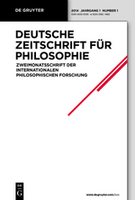
DEUTSCHE ZEITSCHRIFT FUR PHILOSOPHIE
Advancing philosophical discourse since 1953.DEUTSCHE ZEITSCHRIFT FUR PHILOSOPHIE is a prominent academic journal dedicated to advancing the field of philosophy, published by WALTER DE GRUYTER GMBH. Since its inception in 1953 and extending its converged years to 2024, it has been a pivotal platform for scholarly discourse, fostering critical thought and innovative ideas in philosophical studies. With its ISSN 0012-1045 and E-ISSN 2192-1482, the journal holds a commendable position in the academic community, recognized as a Q2 journal in the 2023 Philosophy category, currently ranked #390 out of 806 in the Scopus Arts and Humanities rankings, placing it in the 51st percentile. Although it does not offer open access, its commitment to rigorous peer review ensures that each publication meets high academic standards, making it an invaluable resource for researchers, professionals, and students seeking to engage with contemporary philosophical debates and theories. The journal is situated in Berlin, Germany, at Genthiner Straße 13, D-10785 Berlin, Germany, and continues to be an essential outlet for philosophical inquiry and scholarly achievement.
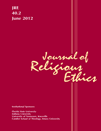
JOURNAL OF RELIGIOUS ETHICS
Advancing Moral Discourse Across TraditionsJOURNAL OF RELIGIOUS ETHICS is a premier academic journal dedicated to fostering scholarly discourse within the field of religious studies, specifically focusing on moral theory and its implications in various religious contexts. Published by Wiley, the journal showcases rigorous research and theoretical exploration related to ethical dimensions of religion, contributing significantly to the broader understanding of moral philosophy. With an impressive 2023 impact factor placing it in the Q1 category of religious studies and a commendable Scopus rank of 126 out of 644, it is positioned amongst the top-tier journals in its field, reflecting its influence and the high quality of its manuscripts. The journal welcomes diverse perspectives and interdisciplinary approaches, making it an essential resource for researchers, educators, and practitioners seeking to deepen their understanding of the ethical implications of various religious traditions. Serving a global audience from its UK base, the JOURNAL OF RELIGIOUS ETHICS continues to be an indispensable platform for innovative scholarship and dialogue.
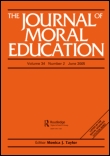
JOURNAL OF MORAL EDUCATION
Pioneering Research in Character EducationJOURNAL OF MORAL EDUCATION, published by ROUTLEDGE JOURNALS, TAYLOR & FRANCIS LTD, stands as a leading scholarly platform in the fields of education and religious studies. With an impressive impact factor and esteemed quartile rankings—Q1 in both Education and Religious Studies—this journal has been pivotal since its inception in 1971, continually addressing the vital role of moral development in educational settings. Researchers and professionals engaged in moral philosophy, pedagogical strategies, and character education will find a wealth of peer-reviewed articles that not only contribute to theoretical discourse but also offer practical insights applicable in diverse educational contexts. While the journal is not open access, its reputation for rigorous scholarship ensures that it remains a premier resource for advancing knowledge and fostering dialogue among educators, researchers, and policymakers alike. The JOURNAL OF MORAL EDUCATION is an essential tool for anyone interested in exploring the intersection of ethics and education, with an eye on shaping the moral compass of future generations.
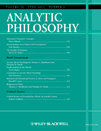
Analytic Philosophy
Illuminating the Path of Modern Philosophical AnalysisAnalytic Philosophy is a prestigious journal published by Wiley, dedicated to advancing critical discourse in the realm of philosophy. With an ISSN of 2153-9596 and an E-ISSN of 2153-960X, this journal has rapidly established itself as a vital resource for researchers, professionals, and students seeking to explore contemporary philosophical debates and analytic methods. Operating from the heart of the United States, located at 111 River St, Hoboken, NJ, it holds an impressive Q1 classification in the field of philosophy for 2023, ranking #190 out of 806 within Scopus's Arts and Humanities category, placing it in the top 76th percentile. The journal’s commitment to rigor and innovation makes it an essential platform for thought-provoking research and discussions in analytic philosophy. Researchers will appreciate the journal’s high standards and its significant impact within the academic community.

Doxa-Cuadernos de Filosofia y Derecho
Advancing Knowledge at the Intersection of Philosophy and LawDoxa-Cuadernos de Filosofia y Derecho, an esteemed journal published by Universidad de Alicante, serves as a vital platform for scholarly discourse in the fields of philosophy and law. Established with the intention of fostering an interdisciplinary understanding, the journal is indexed with an impressive Q1 ranking in Philosophy and a Q2 ranking in Law for 2023. With its Open Access policy implemented since 2016, Doxa ensures that cutting-edge research is freely accessible, promoting wider dissemination of ideas and encouraging academic collaboration. Housed in the picturesque city of Alicante, Spain, Doxa celebrates a converged publishing timeline from 2019 to 2023, reflecting its commitment to contemporary issues and dialogues within both disciplines. As a vital resource for researchers, professionals, and students, this journal invites contributions that push the boundaries of philosophical inquiry and legal scholarship.

JOURNAL OF PHILOSOPHY
Igniting innovative ideas in philosophical inquiry.The Journal of Philosophy, with ISSN 0022-362X and E-ISSN 1939-8549, is a premier academic publication in the field of philosophy, published by J Philosophy Inc. Located in the United States at Columbia University, 709 Philosophy Hall, New York, NY 10027, this esteemed journal serves as a critical platform for rigorous scholarly discourse and innovative research. With a commendable Impact Factor and ranked in the top Q1 category for Philosophy in 2023, the journal holds a prominent position within the academic community, attracting contributions that push the boundaries of philosophical inquiry. The Journal of Philosophy has consistently ranked in the 91st percentile in the Scopus Arts and Humanities rankings (Rank #65/806), underscoring its influence and the relevance of its published works. Though it operates on a subscription model, the journal’s extensive back-catalog and current issues provide invaluable resources for researchers, professionals, and students alike, promoting a deeper understanding of philosophical concepts and stimulating meaningful discussions in contemporary thought.
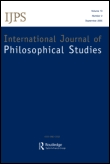
INTERNATIONAL JOURNAL OF PHILOSOPHICAL STUDIES
Illuminating Contemporary Philosophical IssuesINTERNATIONAL JOURNAL OF PHILOSOPHICAL STUDIES, published by Routledge Journals, Taylor & Francis Ltd, is a premier scholarly journal dedicated to the exploration of philosophical inquiry in its diverse forms. Established in 1993, this journal has significantly contributed to the field of Philosophy, currently positioned in the Q2 category of the 2023 rankings, reinforcing its reputation as a pivotal resource for thought-provoking discussions and analyses. With an impressive Scopus Rank of 227 out of 806 in the Arts and Humanities department, this journal achieves a commendable 71st percentile ranking, underscoring its relevance and impact within the academic community. The journal's primary objective is to publish original research that fosters dialogue and debate among scholars while engaging with contemporary philosophical issues. Despite being a traditional subscription-based journal, it remains committed to disseminating high-quality research that shapes the philosophy landscape. For researchers, professionals, and students alike, the INTERNATIONAL JOURNAL OF PHILOSOPHICAL STUDIES is an essential venue for advancing knowledge and understanding in this critical field.